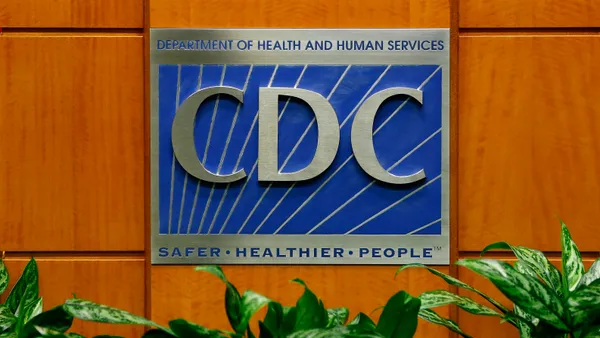Who knew? 2020 will be defined as one of the most tumultuous years in history: a global pandemic and civil strife giving way to innovation and greater collaboration.
Even as COVID-19 vaccines make their way through safety trials and treatments receive expedited review and approval, the 2021 crystal ball remains somewhat murky in terms of what the future holds. Yet there are several trends and market factors that are expected to have a significant impact on the coming year. We’ve identified several of these trends for our annual Year in Preview issue.
We also asked our community of thought leaders to send us the trends they will be tracking in the coming months and years. We thank all who took the time to share their insights and shine a light on what the future holds.
We know for sure over the next 18 to 24 months that the conversation will continue to be dominated by COVID-19 and its impact on all areas of our life. Yet, as we adjust to a new world, business must go on… (PV)
~~~~~~~~~~~~~~~~~~~~~~~~~
Crystal Ball
 Carole Ben-Maimon, M.D.
Carole Ben-Maimon, M.D.
President and CEO
Larimar Therapeutics
We’re tracking the implications for drug development as multiple companies target the same rare diseases. Having numerous approaches to treating these devastating conditions can only be good for patients. That said, this puts a premium on thoughtful clinical trial design and makes it essential to develop efficient ways to generate meaningful data. There’s also a stronger need for close, transparent communication with advocacy groups and patients so that patients can decide which clinical programs best meet their needs, as they usually can’t be in more than one at a time.
 Serge Bodart
Serge Bodart
Chief Commercial Officer
IDDI
The challenge of the COVID-19 crisis also represents an exceptional opportunity to question the way we “do" clinical research. While the pandemic has confirmed there is no alternative to randomized clinical trials (RCT) in proving a drug’s benefit, it has also exposed their vulnerabilities. Endpoints often require access to limited specialized resources, and the cost per participant prohibits recruitment and affects statistical power. What’s more, narrow selection criteria and unnecessarily restrictive protocols mean clinical trials do not always reflect clinical practice. SARS-CoV-2 has demonstrated that RCTs, in their current form, are inflexible and inefficient. But, in the face of necessity, it has also shown that it’s both possible and advisable to embrace new ways of designing, conducting, analyzing, and reporting clinical trials.
 Raza Bokhari, M.D.
Raza Bokhari, M.D.
Executive Co-Chairman of the Board and CEO
FSD Pharma
As the COVID-19 pandemic began to rage at the beginning of this year, it was more than intuitive for us to engage in a Phase II clinical study to evaluate the efficacy of our lead compound, FSD 201, ultra-micronized formulation of Pamoltyl ethylamine (ultra-micro PEA) anti-inflammatory properties by stabilizing mast cells and down-regulating the over-expressed immune response by the COVID-19 virus and mitigating the cytokine storm. In the COVID-19 infection, the killer is not the virus; it is the over-expressed immune response.
 Pol Boudes, M.D.
Pol Boudes, M.D.
Chief Medical Officer
Galectin Therapeutics
Despite the global COVID-19 pandemic, we see a renewed interest in addressing other pressing and deadly illnesses that are in need of new treatments. Patients with liver cirrhosis and cancers cannot wait, and their interest to enroll in clinical trials in those areas remains high. We are pioneering innovation for clinical development in liver cirrhosis due to NASH as we move forward in recruiting patients for a large global Phase II/III clinical trial with belapectin, a galectin-3 inhibitor. We also look forward to confirming encouraging initial results of belapectin in metastatic melanoma by enrolling a larger cohort of patients. For these patients, we use belapectin in combination with pembrolizumab, a check-point inhibitor used in many types of cancers, with the aim to improve its safety and efficacy.
 Daljit Cheema
Daljit Cheema
CEO
Pharmaseal
This year has demanded a dramatic focus on the importance of technology and its value to digital transformation. The success of a clinical trial is based on a number of key factors, but technology must be the central hub of it all.
Designing and implementing the right system for the right organization is a challenge, but one that can be overcome with a proactive approach and important innovative know-how. I believe that 2021 will be the year digital trials will transform the way trials are run in the future to ensure trials are more efficient, better insights are gained, and trial outcomes are improved to enhance the lives of patients.
 Ron Chiarello, Ph.D.
Ron Chiarello, Ph.D.
Founder and CEO
Alveo Technologies
Going into 2021, my focus will be tracking the number of COVID-19 cases across the country and continuing my work to expand access to rapid, affordable, accurate testing. With the nation bracing for a COVID/flu twindemic this winter, and case numbers already spiraling in nearly every state, it will be critical to identify the communities where the rate of transmission is at its highest. Testing disparity has been a huge concern since the virus began taking hold in the United States, but in communities where testing is more readily available, we are seeing better outcomes. This illustrates why it is vital we bridge the testing gap to ensure all communities have access to affordable, rapid, reliable testing.
 Joel Diamond, M.D.
Joel Diamond, M.D.
Chief Medical Officer
2bPrecise
Patient safety has been a key quality measure for years — particularly in preventing adverse events with medications.
Healthcare now realizes that to achieve even greater improvement, it must look beyond simple drug allergies or drug-drug interactions.
Pharmacogenomics (PGx) is a logical and critical next step. By incorporating the results from a noninvasive test (cheek swab), providers can identify genetic variations that may indicate a patient is a rapid or slow metabolizer of medications, which can interfere with drug efficacy and lead to safety concerns (including toxicity). Through PGx testing, particularly among polypharmacy patients, providers have all the information necessary to determine which medication suits the patient best without the risks inherent to trial-and-error decision-making.
 Jeremy Edwards
Jeremy Edwards
CEO
Raremark
We must be mindful that rare disease patients are included in worldwide COVID-19 programs both pre- and post-approval. Given the rate of development of potential treatments and vaccines, should trials include more diverse populations, including those with rare diseases? We know that the plans for mass vaccination programs will adopt a phased approach, with healthcare workers and the vulnerable, including people with rare diseases, being placed at the front of the queue. Will there be differences in safety or efficacy for rare communities, and how will this be monitored?
 Joe G.N. Garcia, M.D.
Joe G.N. Garcia, M.D.
CEO
Aqualung Therapeutics
One of the biggest trends we are tracking is the development and outcomes for therapeutics that treat both early-stage COVID-19 and COVID-19-induced acute respiratory distress syndrome (ARDS). As expected during the time of a pandemic the first priority is to “re-purpose" medications to see if they will have a therapeutic benefit. Since our company is highly focused on acute lung injury and inflammation associated with ARDS, we are closely monitoring some of the ongoing clinical trials. For example, if we look at the IL-6 inhibitors, which have proven successful in rheumatoid arthritis, unfortunately, they have not proven successful in reducing hospitalization or an enhanced mortality benefit in COVID-19 ARDS. We are tracking many companies and their clinical trials, along with FDA interaction so we can ensure we are maximizing and optimizing our overall clinical development and regulatory plans.
 Patrick Hughes
Patrick Hughes
Co-founder and Chief Commercial Officer
CluePoints
The most important trend that we are tracking is the new guidance for Good Clinical Practice, ICH E6 (R3), which will be reviewed and approved in the next 12 to 18 months, all being well. This is a crucial guideline for the industry as it will build on the concepts introduced in E6 (R2), particularly those that focus on a proportionate, risk-based approach to the design and conduct of clinical trials. Sponsors and CROs are already being strongly encouraged to harness these techniques to drive greater efficiencies in the clinical research process but E6 (R3) will ensure that the benefits and approach of risk-based quality management (RBQM) are applied routinely in every trial. This represents a paradigm shift for the industry, one that will improve the outcome of clinical trials both in the quality and integrity of the data and the inherent cost efficiencies of the RBQM process.
 Mike Jagielski
Mike Jagielski
CEO
KCR
The topic of decentralized trials has trended for some years, but the recent announcement of Covance to become a decentralized CRO certainly got our attention. The pandemic forced many organizations to implement innovative solutions for patient support and study continuity, and many of the largest CROs say they expect to see 50% of trials leveraging decentralized methods by 2025. I think this is a big question mark; the feasibility of decentralized trials is strongly related to the scientific complexity of the therapeutic area and existing country-specific infrastructure. To be successful in decentralized trial execution, you must accept a high degree of country-specific solutions; this is where hybrid trials come in. We are actively investigating the method and monitoring the industry for its implementation. It will be interesting to see how it develops.
 Ross Macdonald, M.D.
Ross Macdonald, M.D.
CEO and Managing Director
Cynata Therapeutics
The future of stem cell therapeutics will be a hot topic in 2021 following the unexpected FDA rejection of the first allogeneic MSC therapeutic BLA to be reviewed by the agency, despite a positive recommendation from a panel of expert advisers. MSC therapeutics have been approved in major markets such as Japan and Europe; however, the FDA has raised relevant concerns about manufacturing methods and product consistency. The cell therapy industry will be looking to the FDA for further guidance in 2021. Additionally, cell therapy manufacturing technologies that overcome the inherent challenges associated with conventional manufacturing methods may gain more attention in 2021.
 Matt McNally
Matt McNally
CEO
Outcome Health
Personal connections will become critical to how patients regard HCPs and the healthcare system overall. The isolation caused by the pandemic has revealed gaps in our ability to relate to each other in meaningful ways. Patients’ ability to receive optimal care will be directly impacted by the level of trust, respect, and access they feel and experience with their HCPs. As a result, a grassroots energy toward personal connections will become a different — and yet predominant — type of currency in our health systems.
 Nandini Ramani
Nandini Ramani
Chief Operating Officer
Outcome Health
Embracing collaboration as a form of innovation will be instrumental to success for point of care in 2021. Partnering outside the healthcare industry has enabled us to expand how we innovate in the new “moments of care" and focus on developing services and solutions that provide a true value exchange. While the core doctor-patient interactions continue to be in the physician’s office, POC has expanded beyond to the kitchen, car, computer monitor, smartphone, and every touchpoint of the patient journey.
 Lindsay Rosenwald, M.D.
Lindsay Rosenwald, M.D.
Chairman, President, and CEO
Fortress Biotech
We’ll likely see changes to the deal-making environment in 2021. Executives aren’t mingling at conferences, chatting on airplanes, or conducting in-person business development meetings, so there’s not as much informal networking happening. We’ve already seen less competition for some of the in-licensing opportunities, and we believe it’s attributable to this new virtual world we’re living in.
 Andrew Rut, M.D.
Andrew Rut, M.D.
CEO
MyMeds&Me
2021 will present one of the largest challenges the pharma industry has ever faced — mass vaccination campaigns for COVID-19. I see these campaigns as large real-world studies of both the effectiveness of these vaccines, but more importantly their true safety profiles across an ethnically diverse population, including many people with pre-existing conditions and concomitant medications. All manufacturers of medicines will be impacted, but most of all those with a COVID-19 portfolio. All of pharma must be ready to capture the huge influx of safety information and provide it in real time for rapid analysis and assessment of benefit-risk. We owe it to the public to operate under the highest standards of scientific integrity. Any missteps will undermine public confidence in the vaccines and reduce uptake.
 Jonas Skjodt Moller
Jonas Skjodt Moller
CEO
Albumedix
This year, the biggest impact on our industry has obviously been the COVID-19 pandemic. As we are supplying customers developing diagnostics, medical devices, and vaccines in the fight against the coronavirus, we are vigilantly watching these developments. Solving challenges in cold-chain storage and transportation are central issues, important in both ensuring COVID-19 vaccines reach patients worldwide, but also an issue advanced therapy developers are addressing to make therapies scalable. Examples here include stability of mRNA vaccines requiring -80°C storage, as well as an increasing trend toward ‘thaw and inject’ of cellular therapies.
 Bernard Vrijens
Bernard Vrijens
CEO and Scientific Lead
Aardex Group
Decentralized clinical trials (DCTs) represent a major opportunity to modernize and optimize the traditionally conservative drug development process. DCTs and hybrid studies allow the industry to continue development safely and to secure future revenues. DCTs offer more people easier access to studies, speed up recruitment, and are better able to reach underserved communities, benefiting pharma, regulators, payers, and patients alike. But they also reduce sponsor control over medication adherence, and this can jeopardize results.
 Melonie Warfel
Melonie Warfel
General Manager,
Life Sciences
Model N
The most important trend for 2021 is the industry’s emphasis on pandemic recovery. Our recent survey illustrates that pandemic-driven revenue impacts and delays are key concerns as we approach the new year — 46% of respondents said the coronavirus has impacted revenue, primarily by delaying product launches. Some 49% of executives say pandemic recovery is their top 2021 priority, while 55% cite product launches as the way back. Another trend is most executives believe their companies will need to invest more in technology to solve financial/revenue challenges in the future.










